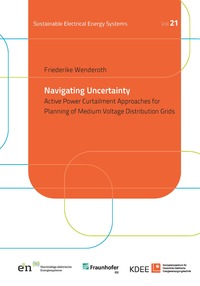
The installed capacity of renewable energy sources (RES) in distribution grids is rapidly increasing due to the acceleration of the energy transition. This is a challenge for grid planners, as investment decisions for RES plants can be made quickly, but grid reinforcement procedures are slow. Predictive planning is required to integrate new RES plants, despite large uncertainties regarding their size, timing, and location. Active power curtailment (APC) can address these uncertainties by serving as an interim solution to defer or avoid grid reinforcement. This thesis explores APC-based grid planning approaches, proposing a new framework that combines existing methods and addresses multi-year planning under uncertainty. Key performance indicators for robustness and optimality are defined, enabling risk analysis for planning decisions. A case study on a real grid model demonstrates the impact of curtailment restrictions, reactive power operation, and curtailment costs on the optimal trade-off between reinforcement and curtailment. The thesis advocates for economically efficient grid expansion, balancing reinforcement costs with curtailment expenses.